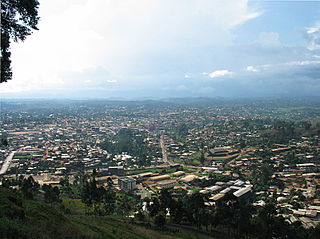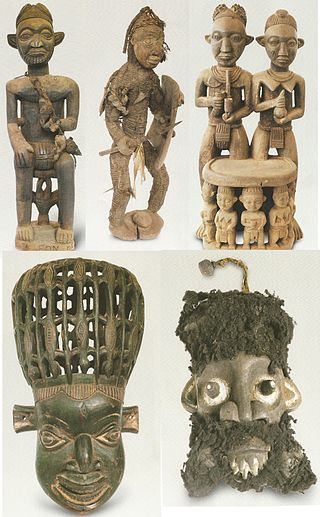Related Research Articles

Cameroon, officially the Republic of Cameroon, is a country in Central Africa. It shares boundaries with Nigeria to the west and north, Chad to the northeast, the Central African Republic to the east, and Equatorial Guinea, Gabon and the Republic of the Congo to the south. Its coastline lies on the Bight of Biafra, part of the Gulf of Guinea and the Atlantic Ocean. Due to its strategic position at the crossroads between West Africa and Central Africa, it has been categorized as being in both camps. Its nearly 27 million people speak 250 native languages and English or French or both.
The Cameroon Armed Forces are the military of the Republic of Cameroon. The armed forces number 40,000 personnel in ground, air, and naval forces. There are approximately 40,000 troops in the army across three military regions. Approximately 1,300 troops are part of the Cameroonian Navy, which is headquartered at Douala. Under 600 troops are part of the Air Force. There is an additional 12,500 paramilitary troops that serve as a gendarmerie or reconnaissance role.
An arrondissement ) is any of various administrative divisions of France, Belgium, Haiti, certain other Francophone countries, as well as the Netherlands.

Paul Biya is a Cameroonian politician who has served as the President of Cameroon since 6 November 1982, having previously been Prime Minister of Cameroon from 1975 to 1982. He is the second-longest-ruling president in Africa, the longest consecutively serving current non-royal national leader in the world and the oldest head of state in the world.

The Northwest Region, or North-West Region is one of ten regions of Cameroon. Its regional capital is Bamenda. The Northwest Region was part of the Southern Cameroons, found in the western highlands of Cameroon. It is bordered to the southwest by the Southwest Region, to the south by the West Region, to the east by the Adamawa Region, and to the north by Nigeria. Various Ambazonian nationalist and separatist factions regard the region as being distinct as a polity from Cameroon.

The East Region occupies the southeastern portion of the Republic of Cameroon. It is bordered to the east by the Central African Republic, to the south by Congo, to the north by the Adamawa Region, and to the west by the Centre and South Regions. With 109,002 km2 of territory, it is the largest region in the nation as well as the most sparsely populated. Historically, the peoples of the East have been settled in Cameroonian territory for longer than any other of the country's many ethnic groups, the first inhabitants being the Baka pygmies.

Ambazonia, alternatively the "Federal Republic of Ambazonia" or "State of Ambazonia", is a political entity proclaimed by Anglophone separatists who are seeking independence from Cameroon. The separatists claim that Ambazonia should consist of the Northwest Region and Southwest Region of Cameroon. Since 2017, Ambazonian rebels are in an armed conflict with the Cameroonian military, in what is known as the Anglophone Crisis, setting up a government-in-exile and capturing some territory. No country has recognized Ambazonia's existence as of 2023.

Bamenda, also known as Abakwa and Mankon Town, is a city in northwestern Cameroon and capital of the Northwest Region. The city has a population of about 2 million people and is located 366 km (227 mi) north-west of the Cameroonian capital, Yaoundé. Bamenda is known for its cool climate and scenic hilly location.

Mbalmayo is a town in Cameroon's Centre Region. The town had 60,091 inhabitants in 2012. It is the capital of the Nyong-et-So'o Division It is located at the banks of the Nyong river between Ebolowa and Yaoundé. It is an agricultural centre and has an important function as a centre of education. It has several primary and secondary schools owned by the government, Roman Catholic Church, Religious bodies and lay Private individuals. It is a beautiful town with many tourist attractions, once in town you can visit the Roman Catholic cathedral built during the colonial era, the water catchment at Akomnyada, the Marianne Sanctuary at Nkolbindi, two wood transformation factories Exam placage and COCAM, an old German bridge across the Nyong river constructed by Germans in the early 1900s and so on. The hotel and lodging sector is fast growing with many modern hotels and lodging structures springing up like mushrooms.

Cameroon is home to at least 250 languages, with some accounts reporting around 600. These include 55 Afro-Asiatic languages, two Nilo-Saharan languages, four Ubangian languages, and 169 Niger–Congo languages. This latter group comprises one Senegambian language (Fulfulde), 28 Adamawa languages, and 142 Benue–Congo languages . French and English are official languages, a heritage of Cameroon's colonial past as a colony of both France and the United Kingdom from 1916 to 1961. Eight out of the ten regions of Cameroon are primarily francophone, representing 83% of the country's population, and two are anglophone, representing 17%. The official percentage of French and English speakers by the Presidency of Cameroon is estimated to be 70% and 30% respectively.

Ndian is a department of Southwest Region in Cameroon. It is located in the humid tropical rainforest zone about 650 km (400 mi) southeast of Yaoundé, the capital.

Boko Haram, officially known as Jamā'at Ahl as-Sunnah lid-Da'wah wa'l-Jihād, is an Islamist militant organization based in northeastern Nigeria, which is also active in Chad, Niger, northern Cameroon, and Mali. Boko Haram was the world's deadliest terror group during part of the mid-2010s according to the Global Terrorism Index. In 2016, the group split, resulting in the emergence of a hostile faction known as the Islamic State's West Africa Province.

The Boko Haram insurgency began in July 2009, when the militant Islamist and jihadist rebel group Boko Haram started an armed rebellion against the government of Nigeria. The conflict is taking place within the context of long-standing issues of religious violence between Nigeria's Muslim and Christian communities, and the insurgents' ultimate aim is to establish an Islamic state in the region.
The Rumpi Hills Wildlife Reserve is a reserve in the Rumpi Hills in western Cameroon. This site is 452 square kilometres (175 sq mi) in area.
Bangolan may refer to:

Babungo is one of the four villages of Babessi Sub Division, Ngoketunjia Division of the North West Region Cameroon. It is situated on the Ring Road from Bamenda about ten kilometers from Bamunka on the high plain of Ndop which is fertile and rich in water, intensely cultivated and surrounded by a ring of hills covered with pastures, making it an ideal grazing land.
Bamali village is one of the four villages that make up Ndop Central sub division and one of the thirteen villages of Ngoketunjia division of the North West region of Cameroon. Bamali village is located partly along the ring road from Bamenda some 40 km away from Bamenda town on the Bamenda-Nkambe stretch of the ring road just before reaching Bamunka.

The Anglophone Crisis, also known as the Ambazonia War or the Cameroonian Civil War, is an ongoing armed conflict between Cameroon Armed Forces and Ambazonian separatist rebel groups, part of the long-standing Anglophone problem. Following the suppression of 2016–17 protests by Cameroonian authorities, separatists in the Anglophone regions launched a guerrilla campaign and later proclaimed independence. Within two months, the government of Cameroon declared war on the separatists and sent its army into the Anglophone regions.
This is a timeline of the Anglophone Crisis during 2020.
Capital punishment is a legal punishment in Cameroon. However, it has not carried out any official executions since 1997, meaning that it has not carried out any executions in the past 10 years, making it de facto abolitionist, since it also has a moratorium.
References
- ↑ "3rd RGPH 2005" (PDF). Archived from the original (PDF) on 2017-12-16. Retrieved 2016-11-20.
- ↑ NEWSPAPER, THE POST. "4 More Killed In Bangolan Fondom Crisis". CameroonPostline. Mbunwe Albert. Retrieved 20 November 2016.